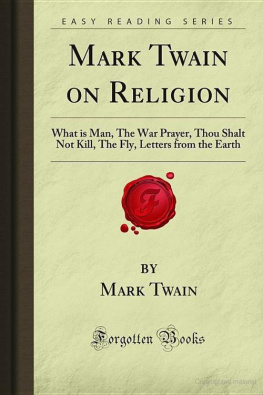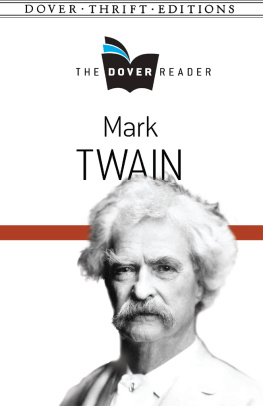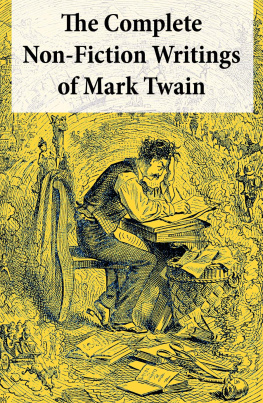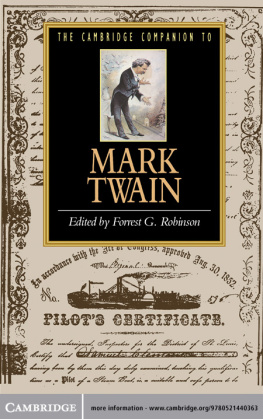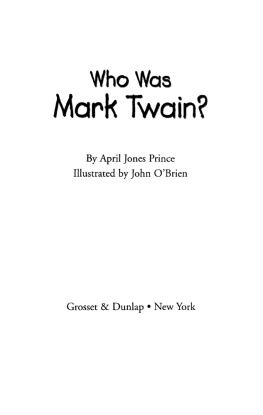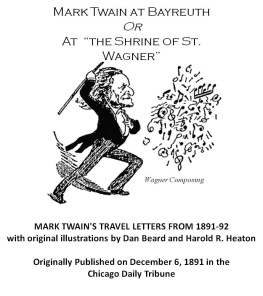Mark Twain - Some Rambling Notes of an Idle Excursion
Here you can read online Mark Twain - Some Rambling Notes of an Idle Excursion full text of the book (entire story) in english for free. Download pdf and epub, get meaning, cover and reviews about this ebook. year: 2004, genre: Prose / Humor. Description of the work, (preface) as well as reviews are available. Best literature library LitArk.com created for fans of good reading and offers a wide selection of genres:
Romance novel
Science fiction
Adventure
Detective
Science
History
Home and family
Prose
Art
Politics
Computer
Non-fiction
Religion
Business
Children
Humor
Choose a favorite category and find really read worthwhile books. Enjoy immersion in the world of imagination, feel the emotions of the characters or learn something new for yourself, make an fascinating discovery.

- Book:Some Rambling Notes of an Idle Excursion
- Author:
- Genre:
- Year:2004
- Rating:5 / 5
- Favourites:Add to favourites
- Your mark:
- 100
- 1
- 2
- 3
- 4
- 5
Some Rambling Notes of an Idle Excursion: summary, description and annotation
We offer to read an annotation, description, summary or preface (depends on what the author of the book "Some Rambling Notes of an Idle Excursion" wrote himself). If you haven't found the necessary information about the book — write in the comments, we will try to find it.
Some Rambling Notes of an Idle Excursion — read online for free the complete book (whole text) full work
Below is the text of the book, divided by pages. System saving the place of the last page read, allows you to conveniently read the book "Some Rambling Notes of an Idle Excursion" online for free, without having to search again every time where you left off. Put a bookmark, and you can go to the page where you finished reading at any time.
Font size:
Interval:
Bookmark:
SOME RAMBLING NOTES OF AN IDLE EXCURSION
by Mark Twain
I.
All the journeyings I had ever done had been purely in the way of business. The pleasant May weather suggested a novelty namely, a trip for pure recreation, the bread-and-butter element left out. The Reverend said he would go, too; a good man, one of the best of men, although a clergyman. By eleven at night we were in New Haven and on board the New York boat. We bought our tickets, and then went wandering around here and there, in the solid comfort of being free and idle, and of putting distance between ourselves and the mails and telegraphs.
After a while I went to my stateroom and undressed, but the night was too enticing for bed. We were moving down the bay now, and it was pleasant to stand at the window and take the cool night breeze and watch the gliding lights on shore. Presently, two elderly men sat down under that window and began a conversation. Their talk was properly no business of mine, yet I was feeling friendly toward the world and willing to be entertained. I soon gathered that they were brothers, that they were from a small Connecticut village, and that the matter in hand concerned the cemetery. Said one:
"Now, John, we talked it all over amongst ourselves, and this is what we've done. You see, everybody was a-movin' from the old buryin'-ground, and our folks was 'most about left to theirselves, as you may say. They was crowded, too, as you know; lot wa'n't big enough in the first place; and last year, when Seth's wife died, we couldn't hardly tuck her in. She sort o' overlaid Deacon Shorb's lot, and he soured on her, so to speak, and on the rest of us, too. So we talked it over, and I was for a lay out in the new simitery on the hill. They wa'n't unwilling, if it was cheap. Well, the two best and biggest plots was No. 8 and No. 9both of a size; nice comfortable room for twenty-sixtwenty-six full-growns, that is; but you reckon in children and other shorts, and strike an average, and I should say you might lay in thirty, or maybe thirty-two or three, pretty genteelno crowdin' to signify."
"That's a plenty, William. Which one did you buy?"
"Well, I'm a-comin' to that, John. You see, No. 8 was thirteen dollars, No. 9 fourteen"
"I see. So's't you took No. 8."
"You wait. I took No. 9. And I'll tell you for why. In the first place, Deacon Shorb wanted it. Well, after the way he'd gone on about Seth's wife overlappin' his prem'ses, I'd 'a' beat him out of that No. 9 if I'd 'a' had to stand two dollars extra, let alone one. That's the way I felt about it. Says I, what's a dollar, anyway? Life's on'y a pilgrimage, says I; we ain't here for good, and we can't take it with us, says I. So I just dumped it down, knowin' the Lord don't suffer a good deed to go for nothin', and cal'latin' to take it out o' somebody in the course o' trade. Then there was another reason, John. No. 9's a long way the handiest lot in the simitery, and the likeliest for situation. It lays right on top of a knoll in the dead center of the buryin' ground; and you can see Millport from there, and Tracy's, and Hopper Mount, and a raft o' farms, and so on. There ain't no better outlook from a buryin'-plot in the state. Si Higgins says so, and I reckon he ought to know. Well, and that ain't all. 'Course Shorb had to take No. 8; wa'n't no help for 't. Now, No. 8 jines onto No. 9, but it's on the slope of the hill, and every time it rains it 'll soak right down onto the Shorbs. Si Higgins says 't when the deacon's time comes, he better take out fire and marine insurance both on his remains."
Here there was the sound of a low, placid, duplicate chuckle of appreciation and satisfaction.
"Now, John, here's a little rough draft of the ground that I've made on a piece of paper. Up here in the left-hand corner we've bunched the departed; took them from the old graveyard and stowed them one alongside o' t'other, on a first-come-first-served plan, no partialities, with Gran'ther Jones for a starter, on'y because it happened so, and windin' up indiscriminate with Seth's twins. A little crowded towards the end of the lay-out, maybe, but we reckoned 'twa'n't best to scatter the twins. Well, next comes the livin'. Here, where it's marked A, we're goin' to put Mariar and her family, when they're called; B, that's for Brother Hosea and hisn; C, Calvin and tribe. What's left is these two lots herejust the gem of the whole patch for general style and outlook; they're for me and my folks, and you and yourn. Which of them would you rather be buried in?"
"I swan, you've took me mighty unexpected, William! It sort of started the shivers. Fact is, I was thinkin' so busy about makin' things comfortable for the others, I hadn't thought about being buried myself."
"Life's on'y a fleetin' show, John, as the sayin' is. We've all got to go, sooner or later. To go with a clean record's the main thing. Fact is, it's the on'y thing worth strivin' for, John."
"Yes, that's so, William, that's so; there ain't no getting around it. Which of these lots would you recommend?"
"Well, it depends, John. Are you particular about outlook?"
"I don't say I am, William, I don't say I ain't. Reely, I don't know. But mainly, I reckon, I'd set store by a south exposure."
"That's easy fixed, John. They're both south exposure. They take the sun, and the Shorbs get the shade."
"How about site, William?"
"D's a sandy sile, E's mostly loom."
"You may gimme E, then; William; a sandy sile caves in, more or less, and costs for repairs."
"All right, set your name down here, John, under E. Now, if you don't mind payin' me your share of the fourteen dollars, John, while we're on the business, everything's fixed."
After some Niggling and sharp bargaining the money was paid, and John bade his brother good night and took his leave. There was silence for some moments; then a soft chuckle welled up from the lonely William, and he muttered: "I declare for 't, if I haven't made a mistake! It's D that's mostly loom, not E. And John's booked for a sandy site after all."
There was another soft chuckle, and William departed to his rest also.
The next day, in New York, was a hot one. Still we managed to get more or less entertainment out of it. Toward the middle of the afternoon we arrived on board the stanch steamship Bermuda, with bag and baggage, and hunted for a shady place. It was blazing summer weather, until we were half-way down the harbor. Then I buttoned my coat closely; half an hour later I put on a spring overcoat and buttoned that. As we passed the light-ship I added an ulster and tied a handkerchief around the collar to hold it snug to my neck. So rapidly had the summer gone and winter come again?
By nightfall we were far out at sea, with no land in sight. No telegrams could come here, no letters, no news. This was an uplifting thought. It was still more uplifting to reflect that the millions of harassed people on shore behind us were suffering just as usual.
The next day brought us into the midst of the Atlantic solitudesout of smoke-colored sounding into fathomless deep blue; no ships visible anywhere over the wide ocean; no company but Mother Carey's chickens wheeling, darting, skimming the waves in the sun. There were some seafaring men among the passengers, and conversation drifted into matter concerning ships and sailors. One said that "true as the needle to the pole" was a bad figure, since the needle seldom pointed to the pole. He said a ship's compass was not faithful to any particular point, but was the most fickle and treacherous of the servants of man. It was forever changing. It changed every day in the year; consequently the amount of the daily variation had to be ciphered out and allowance made for it, else the mariner would go utterly astray. Another said there was a vast fortune waiting for the genius who should invent a compass that would not be affected by the local influences of an iron ship. He said there was only one creature more fickle than a wooden ship's compass, and that was the compass of an iron ship. Then came reference to the well known fact that an experienced mariner can look at the compass of a new iron vessel, thousands of mile from her birthplace, and tell which way her head was pointing when she was in process of building.
Font size:
Interval:
Bookmark:
Similar books «Some Rambling Notes of an Idle Excursion»
Look at similar books to Some Rambling Notes of an Idle Excursion. We have selected literature similar in name and meaning in the hope of providing readers with more options to find new, interesting, not yet read works.
Discussion, reviews of the book Some Rambling Notes of an Idle Excursion and just readers' own opinions. Leave your comments, write what you think about the work, its meaning or the main characters. Specify what exactly you liked and what you didn't like, and why you think so.




